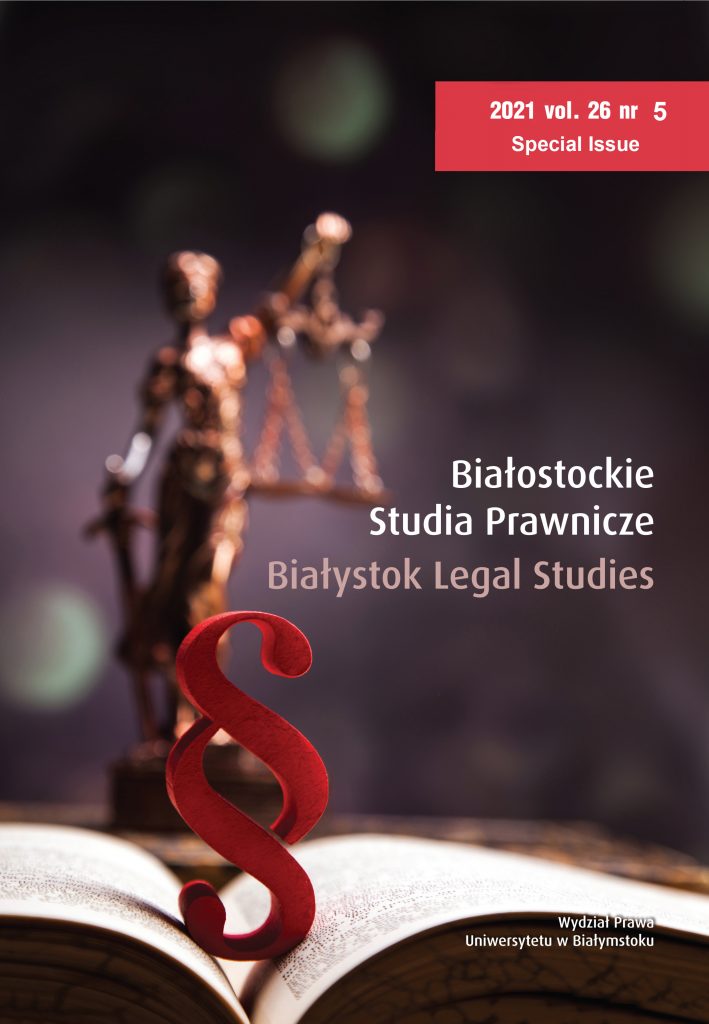The Role of Fiscal Expenditure Rules in Maintaining the Financial Stability of the State
Słowa kluczowe:
deficit, escape clause, expenditure rule, fiscal rules, financial stabilityAbstrakt
One of the main challenges which legal science faces nowadays is the creation of legal mechanisms guaranteeing sound public finance. The aim of this article is to assess the role of national fiscal rules in maintaining financial stability. Firstly, to fulfil this aim, the role of fiscal rules and their efficiency was analysed. Next, based on the commonly used tool assessing the quality of national fiscal rules – the Fiscal Rule Index – the quality of expenditure rules in the EU countries was analysed in order to evaluate the Polish stabilising expenditure rule and the escape clause of its application. Therefore, the following research question is to be answered: whether in the face of an unstable financial situation of the state connected with an increasing deficit, deviation from the stabilising expenditure rule should be considered as being right. Research methods based on non-reactive research, i.e., analysis of professional literature, legal acts, and statistical data published by the European Commission, were used in this article. Due to this analysis, it was indicated that expenditure rules are regarded as one of the most effective tools to manage public funds, and therefore any derogations from the application of these rules should be evaluated negatively.Bibliografia
Anderson B., Minarik J.J., Design choices for fiscal policy rules, (in:) Fiscal Policy: current issues and challenges, Research Department Public Finance Workshop, Banca d’Italia 2007.10.2139/ssrn.2004407
Ayuso-i-Casals J., Deroose S., Flores E., Moulin L., Policy Instruments for Sound Fiscal Policies. Fiscal Rules and Institutions, Brussels, Basingstoke 2009.10.1057/9780230271791
Belu Manescu C., Bova E., Effectiveness of national expenditure rules: Evidence from EU member states, https://voxeu.org/article/effectiveness-national-expenditure-rules.
Belu Manescu C., Bova E., National Expenditure Rules in the EU: An Analysis of Effectiveness and Compliance, DISCUSSION PAPER 124, April 2020, https://ec.europa.eu/info/sites/default/files/economyfinance/dp124_en_national_expenditure.pdf.
Corbacho A., Ter-Minssian T., Public Financial Management Requirements for Effective Implementation of Fiscal Rules, (in:) R. Allen, R. Hemming, B. Potter (eds.), The International Handbook of Public Financial Management, London 2013.10.1057/9781137315304_3
European Commission, Fiscal rules database, https://ec.europa.eu/info/publications/fiscal-rules-database_en.
European Commission, Report from the Commission. Poland. Report prepared in accordance with Article 126(3) of the Treaty on the Functioning of the European Union, Brussels, 20.5.2020 COM(2020) 554 final.
European Commission, Report on Public Finances in EMU (online) 2019, INSTITUTIONAL PAPER 133, July 2020. Part II Performance of spending rules at EU and national level – a quantitative assessment.
Franek S., Reguły fiskalne w przemianach instytucjonalnych finansów publicznych, „Zeszyty Naukowe Uniwersytetu Szczecińskiego, Finanse, Rynki Finansowe, Ubezpieczenia” 2010, no. 39.
Franek S., Postuła M., Pomiar siły instrumentów fiskalnych oraz ich skuteczność w poprawie stabilności finansów publicznych w krajach Unii Europejskiej, „Materiały i Studia NBP” 2019, no. 334.
Kopits G., Symanski S., Fiscal policy rules, IMF Occasional Paper 162, Washington 1998.10.5089/9781557757043.084
Lotko E., Zawadzka-Pąk U.K., Prawnofinansowe instrumenty ograniczania deficytu i długu publicznego w Polsce na tle doświadczeń europejskich, Bialystok 2018.
Machelski T., European Union financial crisis – austerity or political short-termism to blame? „Białostockie Studia Prawnicze” 2014, z. 16.10.15290/bsp.2014.16.06
Marchewka-Bartkowiak K., Reguły fiskalne, „Analizy BAS” 2010, no. 7.
Marchewka-Bartkowiak K., Reguły fiskalne w warunkach kryzysu finansów publicznych, „Ekonomia i Praw” 2012, no. 3.10.12775/EiP.2012.023
Misiak M., Pakt Stabilności i Wzrostu w dobie kryzysu fiskalnego w Unii Europejskiej, „Acta Universitatis Lodziensis. Folia Oeconomica” 2010, no. 238.
Mroczkowski R., Numeryczne reguły wydatkowe jako instrumenty wzmacniające stabilność fiskalną, (in:) W. Miemiec, K. Sawicka (eds.), Instytucje prawnofinansowe w warunkach kryzysu gospodarczego, Warsaw 2014.
Postuła M., Kawarska A., Wpływ reguł fiskalnych na strukturę wydatków publicznych w krajach Unii Europejskiej, „Annales Universitatis Mariae Curie-Skłodowska, sectio H – Oeconomia” 2020, vol. 54, no. 4.10.17951/h.2020.54.4.111-124
Poterba, J.M., Do Budget Rules Work? NBER Working Paper no. 5550. National Bureau of Economic Research, Cambridge 1996.
Rada Ministrów, Wieloletni Plan Finansowy Państwa na lata 2021–2024, April 2021.
Tyniewicki M., Medium-term budgetary frameworks in the light of Council Directive 2011/85/EU as a basic of multiannual financial planning in member states, „Białostockie Studia Prawnicze” 2014, z. 16.10.15290/bsp.2014.16.02
Wójtowicz K., Problem konstrukcji optymalnej reguły fiskalnej w warunkach kryzysu finansowego, „Zeszyty Naukowe. Polskie Towarzystwo Ekonomiczne” 2011, no. 10.10.12775/EiP.2012.023



